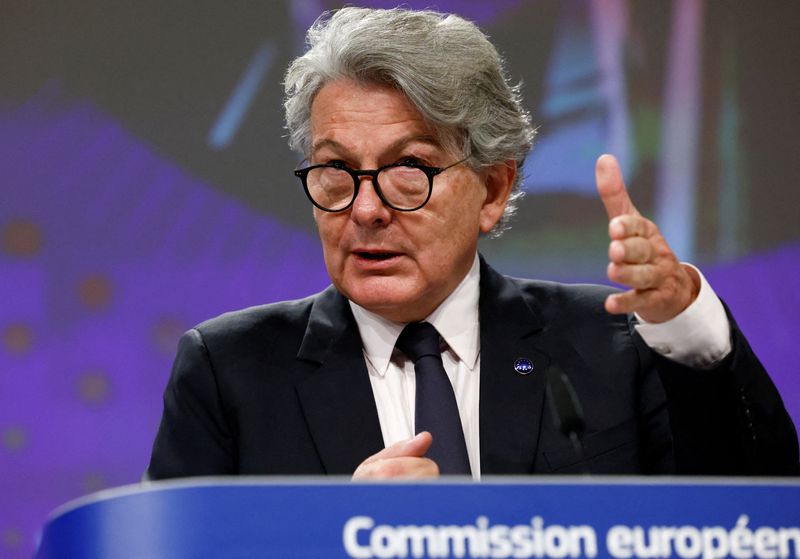By David Lawder
WASHINGTON (Reuters) - The European Union wants a deal quickly with the United States to resolve a dispute over U.S. electric vehicle tax credits, but the EU must pursue its own green technology subsidies to keep investment at home, EU Internal Market Commissioner Thierry Breton said on Friday.
Breton, in Washington to discuss a range of technology issues with U.S. officials, said that $369 billion worth of tax subsidies in President Joe Biden's Inflation Reduction Act (IRA) would drive investment in U.S. clean energy supply chains to solar panels and wind turbines from electric vehicles.
"And we already see the impact: a pull factor for European investment towards the U.S.," he said in remarks to the Center for Strategic and International Studies. "Now Europe must also develop its own policy approach to secure its industrial clean tech basis."
Last week, European Commission President Ursula von der Leyen announced plans for the Net Zero Industry Act, for EU clean technology subsidies to encourage investment.
The EU law would "draw inspiration" from the IRA law, but "without emulating all their elements," as it would be more transparent and would seek to avoid competitive and discriminatory practices, Breton said.
Breton later acknowledged to reporters that the U.S. Congress, now split with Republicans controlling the House of Representatives and Biden's Democrats controlling the Senate, would not change the U.S. law because of its importance to the Biden administration.
It could help revive some regions of the United States that have suffered from factory closures in the past, Breton said.
"We need now to have our own answer for the clean tech industry," Breton said, comparing the work to the EU's 45-billion-euro semiconductor investment law aimed at building up chip making capacity.
The EU chips act also counteracts a $52 billion U.S. semiconductor production and research act signed into law by Biden last year.
Breton said, however, that he was encouraged by the formation of a U.S.-EU task force to try to resolve disputes over the $7,500 U.S. electric vehicle tax credit available only to North American-assembled vehicles meeting regional battery content rules. A solution needed to find a way to make EU vehicles eligible for the credits, Breton said.
